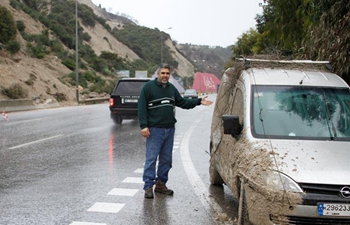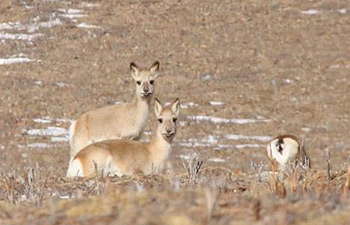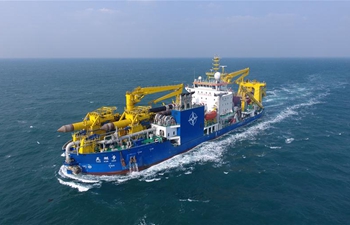
Turkish President Recep Tayyip Erdogan speaks at Justice and Development Party's parliamentary meeting in Ankara, Turkey, on Jan. 15, 2019. Recep Tayyip Erdogan said Tuesday that his country would establish a safe zone in northern Syria, following a phone call with U.S. President Donald Trump amid a row over Turkey's threat to attack the U.S.-backed Kurdish militia in Syria. (Xinhua/Mustafa Kaya)
ANKARA, Jan. 15 (Xinhua) -- Turkish President Recep Tayyip Erdogan said Tuesday that his country would establish a safe zone in northern Syria, following a phone call with U.S. counterpart Donald Trump amid a row over Turkey's threat to attack the U.S.-backed Kurdish militia in Syria.
In a speech to lawmakers of his ruling Justice and Development Party in the parliament, the Turkish leader said that Ankara will establish a 32-km safe zone inside northern Syria after his phone talks with Trump.
Erdogan spoke on the phone with Trump on Monday, in an effort to ease the tensions after the U.S. leader warned Ankara against attacking Kurdish fighters in Syria.
Trump threatened on Twitter that he would "devastate" Turkey's economy if Turkish forces attack the U.S.-backed Kurdish group People's Protection Units (YPG), who helped Washington in its fight against Islamic State (IS) in Syria.
"Messages from Trump's social media account have saddened me and my friends," Erdogan said on Tuesday, referring to Trump's tweet who shocked the Turkish leadership as their country is suffering already from an economic slowdown following a financial crisis last summer, which Ankara blamed on "foreign forces."
The war of words between the two NATO allies followed Trump's surprising decision last month to withdraw 2,000 US troops from northern Syria, potentially leaving the Kurdish militia under threat as Ankara mulls a new offensive there.
Erdogan told lawmakers that Turkey regards Trump's offer of building a 32 km safe zone in Syria "positive," adding that the zone could even go deeper if an agreement is reached.
"I think we have reached an understanding of historical importance with U.S. President Trump (on Syria), and Turkey will do its part in this regard," he said.
Kurdish fighters control around half of the 900-km Turkey-Syria border. Turkey considers the YPG an offshoot of the banned Kurdistan Workers' Party (PKK) fighting for Kurdish autonomy in southeast of Turkey.
In an apparent bid to calm the U.S. president's concerns, Erdogan stated that Turkey's top priority in Syria is to fight the remnants of IS.
The Turkish president said Monday that the safe zone in northern Syria would be cleared of militia groups, without providing further details.
Turkey has been proceeding with a military buildup at the Syrian border for a possible incursion, which would be the third by the Turkish army inside Syria.
"We have said for years that a secure zone or a buffer zone at the Syrian border would ease Turkey's national security concerns. We have to see now how this zone will be set up and how it will work," a Turkish security source told Xinhua.
The source, who spoke on condition of anonymity, didn't elaborate if Turkey would still seek to launch a cross-border operation in northern Syria, after the Trump-Erdogan phone call.
Some analysts believe that Erdogan, known for his aggressive remarks, did not to respond to Trump's threats, signaling a detente with Trump for the sake of seeking cooperation on the Syria issue.
"Erdogan did the right thing by playing down Trump's threat to devastate Turkish economy," Tulin Dalaoglu, a journalist and expert on the U.S.-Turkey ties, told Xinhua.
"This does not make Turkey seem weak against Trump, but shows Erdogan acting in a rational manner watching out for Turkey's best interests," Dalaoglu said.
Trump has established an interesting relationship with Erdogan, and it seems that Erdogan understands the U.S. leader well, she said.











